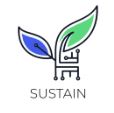Track: Environmental Modelling and Simulation

With a focus on cutting-edge modeling and simulation techniques, this track aims to explore innovative solutions to environmental challenges, predict future scenarios, and inform evidence-based decision-making for sustainable development.
-
Sub-Track 1
Climate and Ecosystems Modelling.
Explore the role of computational models and simulations in predicting environmental changes, assessing risks, and formulating adaptive strategies. Discuss the integration of environmental models with real-time data to enhance predictive accuracy.
- Dynamic Climate Models
- Ecosystem Response to Climate Change
- Carbon and Greenhouse Gas Flux Modeling
- Integrated Climate-Ecosystem Models
- Paleoclimate Reconstruction Models
- Impact of Climate Change on Coastal Ecosystems
- Data Assimilation Techniques in Climate-Ecosystem Models
- Communication of Model Outputs for Decision-Making
-
Sub-Track 2
Analytics for Environmental Sustainability.
Focuses on the innovative use of analytics and data-driven approaches to address environmental challenges and promote sustainable practices. Researchers are invited to submit papers and presentations covering a diverse range of topics related to analytics for environmental sustainability.
- Environmental Data Analytics
- Predictive Modeling for Sustainability
- Optimization Strategies for Resource Management
- Carbon and Ecological Footprint Analytics
- Supply Chain Sustainability Analytics
- Real-Time Monitoring and Alert Systems
- Spatial Analytics for Environmental Planning
- Circular Economy Analytics
- Social Impact Analytics in Environmental Initiatives
- Decision Support Systems for Sustainable Practices
- Blockchain and Transparency in Sustainability Analytics
-
Sub-Track 3
Integrated Environmental and Business Models.
Aims to explore the harmonious integration of environmental considerations into business models. Researchers are invited to submit papers and presentations that investigate innovative approaches to aligning environmental sustainability with business strategies.
- Circular Business Models
- Environmental Accounting and Reporting
- Sustainable Supply Chain Management
- Green Innovation and Product Development
- Eco-Labeling and Certification
- Life Cycle Assessment in Business Decision-Making
- Environmental Risk Management Models
- Triple Bottom Line (TBL) Accounting
- Biodiversity and Business
- Economic Valuation of Ecosystem Services






